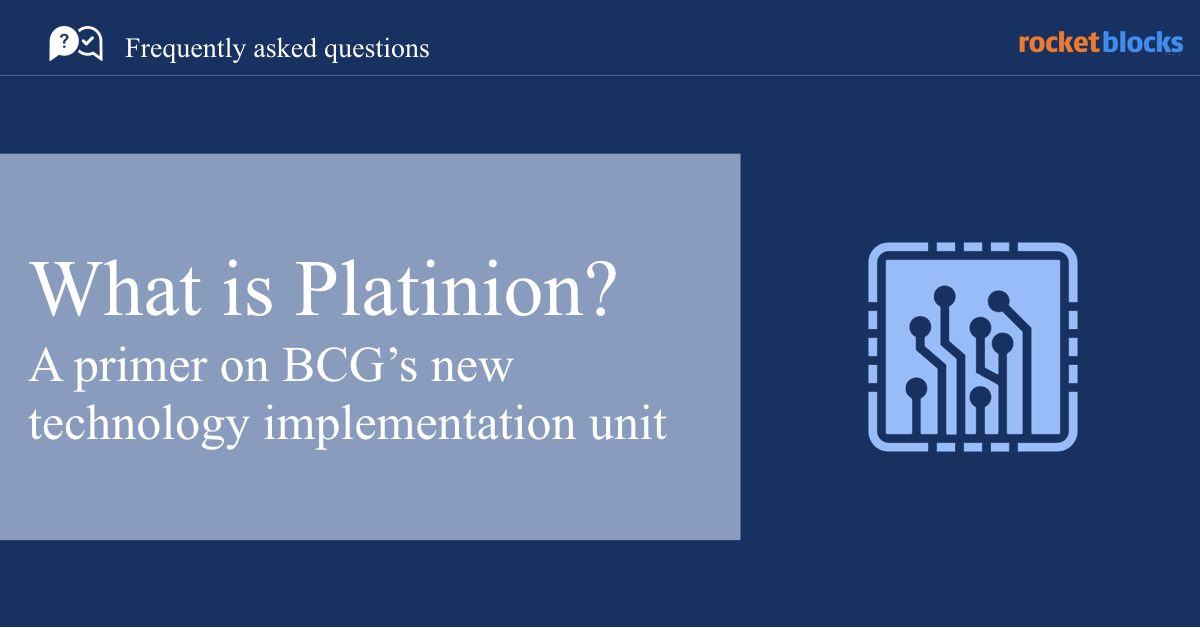What is BCG Platinion?
An overview of BCG's technology enablement group
|
|
|
BCG Platinion is BCG’s dedicated unit for technology strategy consulting and implementation.
Specifically, Platinion focuses on delivering value to clients by enabling their core businesses with technology. Plantinion consultants solve problems related to enterprise architecture, cloud infrastructure, and IT organization. If that still sounds a little vague, or if you’re confused about other BCG units (X, DV, TDA, Gamma) don't worry we'll break it down below and examine the two key parts of this mission.

In this deep dive, we'll cover the following topics:
- Understanding BCG Platinion's mission
- Example Platinion project work
- Why did BCG launch Platinion?
- What type of people BCG Platinion hire?
Let's go!
Understanding BCG Platinion's mission
First, Platinion is actually building and implementing technology - this is the "enablement" part. It's quite distinct from the value proposition BCG "Classic" provides, which focuses on analyzing a business problem or scenario and making a recommendation.
Second, Platinion is squarely focused on helping the client's core business. While other BCG units (like BCG X) might help spin up new initiatives or business lines, Platinion is designed to accelerate and improve the core business with better technology.
The work BCG Platinion does is important and prestigious. In recent years, IT has become a board-level imperative and many companies have created technology executive positions to join existing leadership teams.
What type of client hires BCG Platinion?
The answer is pretty straight-forward: any business that recognizes that modern technology could help accelerate their business but either doesn't have the internal capabilities or doesn't want to develop the capabilities to build software.
For many technology companies (e.g., Google, Amazon) or younger technology enabled companies (e.g., Airbnb), this need likely isn't an issue. However, companies with deep benches of technology and engineering talent that build all their own technology are a small minority of the overall landscape - BCG Platinion can help any company build first-class technology.
In addition to the talent to lead the project, companies hire firms like BCG Platinion because consultants have done many similar projects, and they are able to bring to bear benchmarks, tools, and tactics from previous transformations.
Example BCG Platinion project
--For example, consider the successful car rental company, Hertz.
Hertz is one of the largest global car rental companies. They operate in over 150 countries, employ roughly 40K people and earn roughly $10B in revenues annually. The core of their business is renting cars, and the key ancillary operations to support that: acquiring and maintaining a global fleet of cars, staffing rental centers and booking reservations and eventually selling rental cars back to dealerships.
When Hertz was founded in 1918, it's safe to say they weren't using software to run their business. While Hertz's core business is still renting cars (e.g., it's not a tech company like Google), there is no doubt that Hertz will employ software to streamline their core business and make it as efficient as possible.
Let’s look at a representative Hertz project to understand where Platinion fits in vis-a-vis other BCG technology units.
Imagine that Hertz determines that improving their global reservation software could improve customer service efficiency and enable staff to provide better service. But how can they accomplish this? Hertz doesn't have the right in-house talent to plan out the product needs, staff up an engineering and design team to build it and launch it. This is where BCG Platinion comes in.
Platinion can help Hertz scope out the needs for this project, develop a plan, and steer the implementation.
- The planning phase includes outlining options, setting goals, estimating costs, recommending actions, and creating an implementation plan. This takes about 2-3 months, depending on scope and resources.
- BCG Platinion can then manage the implementation, ensuring project success. During this period Plantinion offers a small consulting team to fill crucial roles. Technology implementations are famous for running long and exceeding budget, so BCG Plantinion’s value in this phase is to reduce delays during a 6-18 month transition period.
Notably, BCG Plantinion does not staff the full implementation workforce (e.g. designers and developers).
How is Platinion different than BCG Digital Ventures?
--If you've already read about BCG X (a combination of two previous BCG brands called BCG Digital Ventures and BCG Gamma) you might wonder: why wouldn't Hertz come to BCG X with this technology project? Aren't they the BCG group focused on building technology?
The answer is that, in contrast to BCG Platinion, BCG X is focused on designing, building and implementing new solutions and businesses, typically involving AI. So for a project like revamping Hertz's global reservation system, Platinion would be the right fit.
Got a BCG interview?

"RocketBlocks was a key component of my success in securing consulting offers from the top 3 consulting firms. I can't recommend its tools enough." -- David Dance, BCG Project Leader
Why did BCG launch Platinion?
Now that we understand what type of work Platinion does, why did BCG launch this unit?
Ultimately, BCG is pursuing a strategy that allows it to help its clients run the gamut: from helping define right strategy to building the right technology to follow through on it.
In many ways, BCG has already proven that the hypothesis of strategy plus implementation works. For example, BCG has a well regarded post-merger integration practice which is focused on how to successfully integrate an acquired company, not on the strategic decision itself to acquire (or not acquire) a company.
BCG is simply extending that principle to technology strategy and implementation. For BCG, this is obviously valuable as a revenue stream and for the client, it's valuable too since they might need help building out the technology and by working with the same company they can gain better alignment between requirements and delivery.
What type of people does BCG Platinion hire?
Finally, let's discuss how Platinion executes on this type of work.
As you can imagine, the talent needed to scope, plan & execute key technology projects is different than the talent base that BCG has traditionally hired in its core strategy consulting group. Hiring at BCG Platinion therefore focuses on profiles such as:
- Technology Consultants and Architects
- Software or cloud architects
- IT Experts (e.g., agile, cybersecurity, devops)
- IT Consultant, IT Architect and others.
You can see a full list of openings on the Platinion careers page, but the key point is that they target technology focused consultants, who understand how technology works in a business context and who look to work with technology on a strategic advisory level.
Summary
Ultimately, BCG Platinion is a logical extension of BCG's strategy consulting efforts. It provides a logical way to deepen relationships with clients by helping with everything: from strategy through implementation.
In addition, as highlighted in our post on the future of consulting, it makes sense for BCG to amp up technology enablement efforts as software continues to become increasingly critical to all aspects of running a business.
Finally, BCG's entrance into this space also opens up the aperture for the type of talent they're hiring - from smart generalists (e.g., MBAs and top undergrads) to engineers and technology architects. If you're interested in product management roles at BCG Platinion or BCG X, check out RocketBlocks PM interview prep below.
P.S. Are you preparing for PM interviews?
Real interview questions. Sample answers from PM leaders at Google, Amazon and Facebook. Plus study sheets on key concepts.



